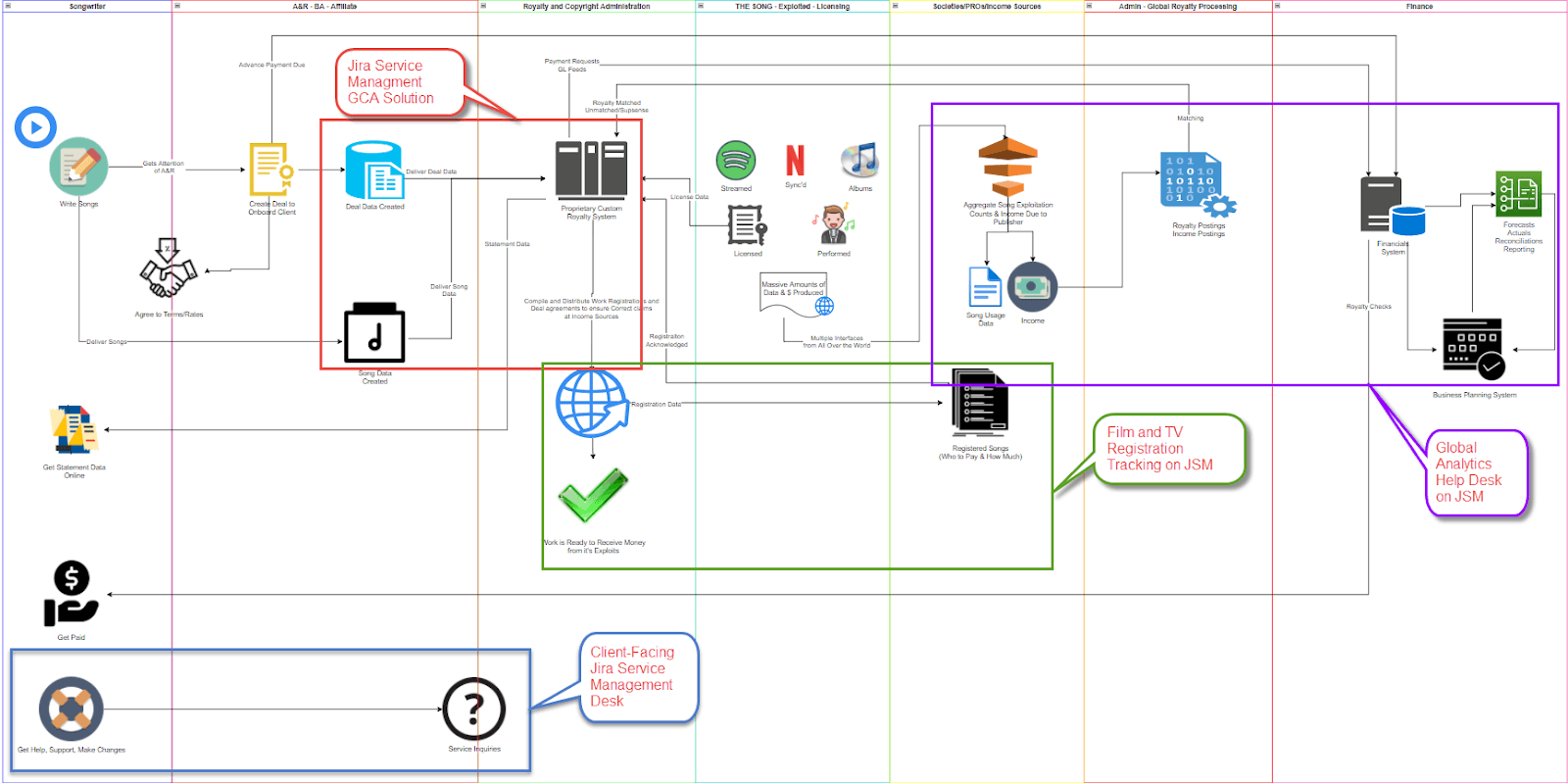
Sony Music Publishing + Atlassian
Digital transformation is a buzzword, but Jira Service Management is helping make it tangible for us.






500
Hours saved each year with automation
2
New jobs created due to improved data visibility
Industry
Media & Entertainment
Location
North American headquarters in Nashville, TN
Number of Users
1,000
Atlassian Products
Apps
Solution Partner
Sony Music Publishing streamlines and automates complex processes across over four million songs with Jira Service Management
As the #1 music publishing company in the world, Sony Music Publishing manages thousands of new requests each week and a collection of over four million songs created by songwriters who rely on the company to protect their art and their livelihood. After primarily using email and internal drives to receive and direct much of their data, SMP saw an opportunity, alongside their rebranding, to explore how they might improve their workflows and technology. By partnering with Trundl and Atlassian to transform their enterprise service management processes with Jira Service Management, SMP is saving thousands of hours each year, increasing visibility into critical data, and providing faster, better service to their overseas affiliated offices and to their global songwriters. It’s all part of their promise to take care of business and each other.
When we play a song on our devices, hear it in a movie, or watch it performed live, the singer is usually the star. But behind that singer is a songwriter (sometimes they’re one and the same), who deserves equal recognition – and equitable compensation. At the beginning of a songwriter’s career, it’s usually fairly easy to track the number of times their song is “exploited” – played, used, broadcasted, or purchased. But as a song grows in popularity and is distributed through a near-infinite number of channels, the complexity crescendos. Tracking exploitations and ensuring that all the right people get paid on time requires best-in-class technology and teams who can manage mountains of data and a sea of stakeholders. That’s exactly the reputation Sony Music Publishing (SMP) has earned with the help of Jira Service Management.
As the #1 music publishing company in the world, SMP administers a collection of over four million songs, from the Beatles, to a rising Swedish composer, to a new and promising Spanish group. This collection grows by hundreds of thousands of new songs every year, leading to billions of income lines via a myriad of sources, depending on how the song was exploited and where.
Up until 2020, SMP’s Global Copyright Administration team (GCA) handled the intake of publishing data with standard office software. They had leveraged a simple service desk through Outlook rules and automations to optimize certain parts of the process, but the available capabilities, capacity, and features left the team wanting more given the rate of growth of the music industry, and the demands thereof. Meanwhile, the volume of requests and the complexity of the team’s needs only continued to grow. GCA needed a more efficient, scalable way to manage the intake process. With Solution Partner Trundl as their innovator and guide, they developed a powerful, productive enterprise service management solution with Jira Service Management.
Transforming a somewhat asynchronous, manual process into a seamless, automated workflow is already saving SMP thousands of hours each year. Having a more organized system and greater visibility into request data and status has also enabled the company’s teams to provide even faster, better service to their songwriters, global affiliate offices, third parties, and licensees, which maintained their competitive advantage and created new jobs in IT and GCA within the first year alone. By partnering with Trundl and Atlassian, SMP has devised a new way to better support their business and their people. And as a result of the available data and efficiencies gained, the way SMP teams and individuals work together is being redefined.
Full visibility and tracking is at the fingertips of all agents and customers alike. That’s the most basic and wonderful gain and overall achievement of what we set out to do. Everyone knows exactly where they or their songs stand at any given time.”
Alison Wood
Director, Global Copyright Administration
Increasing demand and a modern rebrand inspire new possibilities
GCA was the first business team within SMP to pioneer process improvements with Jira Service Management. Despite the number of stakeholders involved, GCA’s legacy workflow for receiving publishing data (to then input into their proprietary system) was quite basic and manual.
Legacy data intake and administration process
- Email intake: 35 global Affiliate offices send their local office's publishing data to GCA team via email.
- Database (ERP) Update: GCA uses Outlook rules and automations to filter the request to the correct data team for handling (song creation and registration via the ERP).
- Registration: SMP cues, processes, and confirms global registrations to income sources (DSPs, Collection Societies). Songs are now "Royalty-Ready."
- Income Matching, Calculation, Processing and Payment: Distributed Publishing income matches to database records and pays out according to interested parties and associated deals.
- Tracking: SMP tracks expected income and data from exploitation and usage.
The GCA leg of this process was at times challenging to track and measure (leading to additional follow-up work for Affiliates and GCA) and not scalable – a growing challenge considering the speed at which SMP’s song collection was expanding. “We were getting bigger and bigger, new deals and new songs, song amendments, deal amendments, and more. A song or deal might require several touches and updates due to revised terms or updates to the associated interested parties. We would get data from IT on volume and throughput, but it wasn’t at our fingertips,” recalls Alison Wood, Director, Global Copyright Administration.
While GCA recognized and considered these challenges, SMP was also going through a rebrand – really a “rebirth” – of their company. Several teams saw this as a prime opportunity to improve processes and tools so that they could better support their team and songwriters. “The name ‘Sony’ is synonymous with technology. Our goal is to meet that expectation and ensure our songwriters know we have the technology to protect and service them. It’s a responsibility to the songwriters and to ourselves,” says Jeff Pittman, Director of IT Operations / Jira Solution Architect at SMP. Patrick Howell, Co-CEO of Trundl, adds, “It was the right time, the right culture, and the right motivation for digital transformation.”
As GCA began exploring potential solutions to solve their challenges and lay a strong foundation for future growth, Jira Service Management stood out immediately. The team appreciated its high configurability and integrations with their existing Jira Software platform as well as with other Atlassian products that would support them as they scaled.
Trundl agreed that Jira Service Management Cloud Premium would enable SMP to “lay a better track that could handle a bigger train,” as Jeff says. GCA wanted to leverage the tool to streamline enterprise service request management and get their team and Affiliates out of their inboxes. A Cloud Premium deployment embodied a future-ready solution supporting fast performance, remote work, and scalability, while offering access to a greater volume of automation rules – a key feature GCA needed. “We said, ‘Let’s get the right tools, right now, and not have to go through procurement for an update later,” Jeff says. “Cloud is also more scalable. We knew demand was going to increase as other business units saw what we were doing and said, ‘I want one of those.’”
Together, SMP and Trundl started exploring what might be possible with Jira Service Management and planning how to make it a reality.
Alison says this new platform offers incomparable transparency and efficiency compared to their legacy system, especially for international teams working asynchronously across time zones. “You can see clear and concise queues, workload and related status of every request,” she explains. “Full visibility and tracking is at the fingertips of all agents and customers alike. That’s the most basic and wonderful gain and overall achievement of what we set out to do. Everyone knows exactly where they or their songs stand at any given time.”
GCA and Affiliates quickly embraced the new workflow after seeing how much faster and easier it made the entire process. Within weeks after launch, GCA Delivery Desk became a go-to tool in GCA’s productivity suite and the envy of other business units.
One workflow, 10 initial automations, endless new efficiencies
As Trundl and GCA began planning their new enterprise service management solution, they took an iterative approach: envision the possibilities, build a minimum viable product, then add to it. “We’re not showing off designs or flexing any Jira Service Management muscles at that stage. We’re just planting the seed of what’s possible, then landing and expanding,” Jeff explains.
Over the course of several months, Trundl and GCA collaborated to build an MVP service request management platform called GCA Delivery Desk. The solution launched in spring 2020 with one workflow consisting of one issue type, one form with nine unique request types, and ten automations to increase efficiency and manage certain nuances of the process. "Subtasks" were also available and appealed to team members wanting to expand on the parent ticket and delegate subtasks.
New Data Delivery and Administration Process with Jira Service Management
- Request intake: Affiliates fill out a brief, yet precise, intake form in “GCA Delivery Desk” (Jira Service Management) in two minutes or less.
- Fulfillment: GCA works the request from Submitted, to Accepted, to In Progress, to Done (or to Reject or Suspend, if necessary).
- Collaboration: Affiliates/Request Reporters see the tickets they submitted, view status and progress, share and edit requests, and communicate with GCA through the desk.
- Integrations: Data is made available for consumption by other systems and dashboards.
- Reporting: Agents and leadership leverage the dashboard for real-time analytics on status, activity, performance, workforce balancing, and trends.

Alison says this new platform offers incomparable transparency and efficiency compared to their legacy system, especially for international teams working asynchronously across time zones. “You can see clear and concise queues, workload and related status of every request,” she explains. “Full visibility and tracking is at the fingertips of all agents and customers alike. That’s the most basic and wonderful gain and overall achievement of what we set out to do. Everyone knows exactly where they or their songs stand at any given time.”
GCA and Affiliates quickly embraced the new workflow after seeing how much faster and easier it made the entire process. Within weeks after launch, GCA Delivery Desk became a go-to tool in GCA’s productivity suite and the envy of other business units.
We’ve built over 200 automations to date. Even if the company saves two minutes per day per automation, that’s almost 1,500 hours of operational savings each year. And that doesn’t even account for context switching or the time you would have spent building reports. Now it’s all at your fingertips.”
Jeff Pittman
Director of IT Operations and Jira Solution Architect
Efficiency and effectiveness climb the charts
As this new system changed the way GCA’s team worked – and thought about their work – they continued collaborating with Trundl on further rollout and iteration. The group followed an agile approach where they added comments and suggestions to a backlog, then met every two weeks to analyze this feedback, review the latest demos, and prioritize new tasks for the upcoming sprint. This approach alleviated typical change management challenges and eased users and stakeholders into the new platform, while building on the MVP with new features and efficiencies.
For example, they implemented new automations within Jira Service Management to auto-assign and date tickets; transition or close tickets when they reach a certain percentage completion; and automatically add comments for customers. They also incorporated the Scriptrunner Marketplace app, which improves thoroughness and accuracy by serving automatic behavioral reminders that ensure employees don’t move tickets into certain statuses unless the work is 100% complete.
“We’ve built over 200 automations to date. Even if the company saves two minutes per day per automation, that’s almost 1,500 hours of operational savings each year. And that doesn’t even account for context switching or the time you would have spent building reports. Now, it’s all at our fingertips,” Jeff says.
Alison adds that, contrary to popular belief, automation has actually helped create jobs. “Because of Jira Service Management, we can see our overall resolution ratio (created versus resolved) as it unfolds in real-time, enabling us to make critical management decisions to stay ahead of potential trends. I can change an automation to route the requests to different people and reduce workload by 25% almost immediately or go to our leadership and say, ‘This is the state of play, these are our resources, let’s talk about next steps.’ We’ve actually been granted two new headcounts because of this.”
Beyond resourcing, Jeff says having real-time data and reports at their fingertips help the team across the organization make more strategic decisions all around. “It’s bringing in a new era of objectivity, rather than arbitrary discussions about volume and pace. There’s a calmness to the conversations now. It’s a metric-based discussion about what we can do better.”
“We want one of those.”
As Jeff predicted when GCA first decided to deploy Jira Service Management Cloud, other business units saw the visibility and efficiency GCA Delivery Desk provided and proclaimed, “We want one of those.” Over time, several departments requested a consultation for a solution of their own and how they could adopt the software for a similar productivity gain, including Legal for contract management; Human Resources for employee onboarding; and the Film and TV Department for productions, registration, and management. SMP also leveraged JSM for their Global Analytics team and Project Management Office, for enterprise PPM. Finance and International Artists & Repertoire are next in line. “You shouldn’t have to invoke email to work with another team. Everyone is a mini service team for another team,” Jeff says. “It [Jira Service Management] is encouraging conversations about how to work together better across teams and centering those conversations around service requirements, not personal requests.”
Streamlining these individual teams and pieces of the process is just the beginning. SMP’s grand vision is to leverage Jira Service Management as part of the company’s greater digital transformation and manage all cross-functional work for songwriters through the platform. Jeff says, “Digital transformation is a buzzword, but Jira Service Management is helping make it tangible for us. Before, people were looking at shared drives, spreadsheets, and emails. Now they see their process as a digital product, through a form, a queue, a dashboard, and a workflow. It’s tangible, and easier for them to understand and see the value.”
Taking care of business and each other
With Atlassian powering their work, Trundl as their partner, and what Jeff calls “a healthy desire and curiosity to improve,” SMP is transforming their work and affiliate relationships, which is trickling down into better service for their songwriters. Powered by Jira Service Management, GCA Delivery Desk is enabling self-service for affiliates and making life infinitely better for SMP’s staff by allowing them to work faster, focus on what’s most important, and shift workloads when needed. Plus, the flexibility and scalability it provides instills confidence that SMP can handle another four million-plus songs as their brand and team expand in the future. “This is just the tip of the iceberg,” Alison says. “I’m excited to see where we'll be six months from now.”
As SMP scales to manage their current songwriters and introduce new talent to the world, they’ll look to Jira Service Management to maintain their reputation for best-in-class technology and service. “Our ethos is to treat a new, local, unproven song out of Colombia with the same diligence, care, and love as an Ed Sheeran hit coming out of the UK,” Alison says. “We’re all in this together. We’re taking care of business and each other – and Atlassian is helping us do it.”





